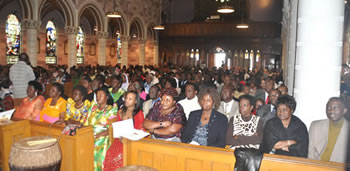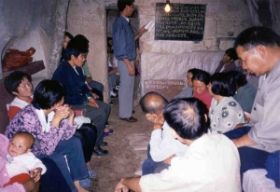"Who Has Invented Our Enmity?"
Ecumenical Generosity For World Communion Sunday
For Sunday October 7, 2012
Lectionary Readings (Revised Common Lectionary, Year B)
Job 1:1, 2:1–10 or Genesis 2:18–24
Psalm 26 or Psalm 8
Hebrews 1:1–4, 2:5–12
Mark 10:2–16
In his book that deserves a wide readership, Exploring Protestant Traditions (2006), my good friend David Buschart explores the distinctives of eight Christian traditions — Lutheran, Anabaptist, Reformed, Anglican, Baptist, Wesleyan, Dispensational, and Pentecostal. He begins his book with an instructive story.
 |
Brazilian Protestant Jesus Parade 2012. |
When Buschart was about ten, he had a talk with his mother, the gist of which was that whereas his buddies were Catholic, Presbyterian, and Methodist, his mother described his family as "just Christians." That description satisfied him in some important ways for some time, but later he began to observe a troubling pattern. Nearly every Christian tradition tried to "occupy an ecclesiastical or spiritual high ground as the genuine descendants of Jesus Christ and 'the New Testament church'" — unlike, of course, all those other imposters.
The Jesus movement fragmented early on — in about twenty years, to be precise. Paul's letter to the Corinthians, written about 55 AD, describes deep divisions in the church there. There were even earlier precedents for oneupmanship: James and John offended the other ten apostles by asking Jesus for positions of glory, on the death walk to Jerusalem they argued about who was the greatest, and one time they tried to stop an anonymous healer because, they complained, "he's not one of us."
This Christian superiority complex is endemic. The Eastern Orthodox churches confess that they alone are "the one true church of Christ on earth." Catholics have claimed that "outside the church there is no salvation." One of the earliest and most colorful expressions of this claim comes from Cyprian (200–258), bishop of Carthage in North Africa, who wrote that “you cannot have God for your Father unless you have the Church for your Mother.” On November 18, 1302, Pope Boniface VIII left no ambiguity in the matter when in Unum Sanctum he wrote, "We declare, say, define, and pronounce that it is absolutely necessary for the salvation of every human creature to be subject to the Roman Pontiff."
 |
Catholics in Kenya. |
Whereas the Orthodox and Catholic traditions place the church "above" the Bible and strictly mediate its interpretation, the Protestant Reformation — with Bibles newly translated into the common vernacular of every day people — placed the Bible directly into the hands of individual believers to read for themselves, thus placing Scripture (that is, their interpretation of it) "over" the church. This revolutionized the role of the Bible in the church, but created new problems, one of which is the Protestant inclination to radical individualism and sectarian splintering into endless new denominations, each one of which believes that it parses the truth better than everyone else. The Orthodox scholar George Florovsky called this Protestant view of Scripture the “sin of the Reformation."
In his poem "To a Siberian Woodsman," Wendell Berry laments the deep distrust between fellow human beings during the Cold War era. In his Soviet neighbor he recognizes his own self.
1.
You lean at ease in your warm house at night after supper,
listening to your daughter play the accordion. You smile
with the pleasure of a man confident in his hands, resting
after a day of long labor in the forest, the cry of the saw
in your head, and the vision of coming home to rest.
Your daughter’s face is clear in the joy of hearing
her own music. Her fingers live on the keys
like people familiar with the land they were born in.You sit at the dinner table late into the night with your son,
tying the bright flies that will lead you along the forest streams.
Over you, as your hands work, is the dream of still pools.
Over you is the dream
of your silence while the east brightens, birds waking close by
you in the trees.2.
I have thought of you stepping out of your doorway at dawn,
your son in your tracks.
You go in under the overarching green branches of the forest
whose ways, strange to me, are well known to you as the sound
of your own voice
or the silence that lies around you now that you have ceased to speak,
and soon the voice of the stream rises ahead of you,
and you take the path beside it.
I have thought of the sun breaking pale through the mists over you
as you come to the pool where you will fish, and of the mist drifting
over the water, and of the cast fly resting light on the face of the pool.3.
And I am here in Kentucky in the place I have made myself
in the world. I sit on my porch above the river that flows muddy
and slow along the feet of the trees. I hear the voices of the wren
and the yellow-throated warbler whose songs pass near the windows
and over the roof. In my house my daughter learns the womanhood
of her mother. My son is at play, pretending to be
the man he believes I am. I am the outbreathing of this ground.
My words are its words as the wren’s song is its song.4.
Who has invented our enmity? Who has prescribed us
hatred of each other? Who has armed us against each other
with the death of the world? Who has appointed me such anger
that I should desire the burning of your house or the
destruction of your children?
Who has appointed such anger to you? Who has set loose the thought
that we should oppose each other with the ruin of forests and
rivers, and the silence of the birds?
Who has said to us that the voices of my land shall be strange
to you, and the voices of your land strange to me?Who has imagined that I would destroy myself in order to destroy you,
or that I could improve myself by destroying you? Who has imagined
that your death could be negligible to me now that I have seen
these pictures of your face?
Who has imagined that I would not speak familiarly with you,
or laugh with you, or visit in your house and go to work with
you in the forest?
And now one of the ideas of my place will be that you would
gladly talk and visit and work with me.5.
I sit in the shade of the trees of the land I was born in.
As they are native I am native, and I hold to this place as
carefully as they hold to it.
I do not see the national flag flying from the staff of the sycamore,
or any decree of the government written on the leaves of the walnut,
nor has the elm bowed before any monuments or sworn the oath of allegiance.
They have not declared to whom they stand in welcome.6.
In the thought of you I imagine myself free of the weapons and
the official hates that I have borne on my back like a hump,
and in the thought of myself I imagine you free of weapons and
official hates,
so that if we should meet we would not go by each other
looking at the ground like slaves sullen under their burdens,
but would stand clear in the gaze of each other.7.
There is no government so worthy as your son who fishes with
you in silence besides the forest pool.
There is no national glory so comely as your daughter whose
hands have learned a music and go their own way on the keys.
There is no national glory so comely as my daughter who
dances and sings and is the brightness of my house.
There is no government so worthy as my son who laughs, as he
comes up the path from the river in the evening, for joy.
And we Christians might fill in the blanks: "There is no church so pure or perfect that . . ."
 |
Chinese house church. |
World Communion Sunday affords us an opportunity to confess our propensity to exclude people who are different from us: "He was not one of us" (Mark 9:38). Buschart recommends what he calls "theological hospitality." Instead of defaulting to our insecurities about those whom we find strange or fringe, to ignorance, fear, and what he so aptly describes as "sincere yet uninformed stereotypes" of others, we do well to celebrate the considerable diversity that exists both within and among our Christian traditions. After all, he observes, one mark of a cult is "enforced conformity," whereas authentic Christianity celebrates genuine diversity along with our many continuities and commonalities.
Image credits: (1) ChristianPost.com; (2) AjabuAfrica.com; and (3) BaptistBulletin.org.





